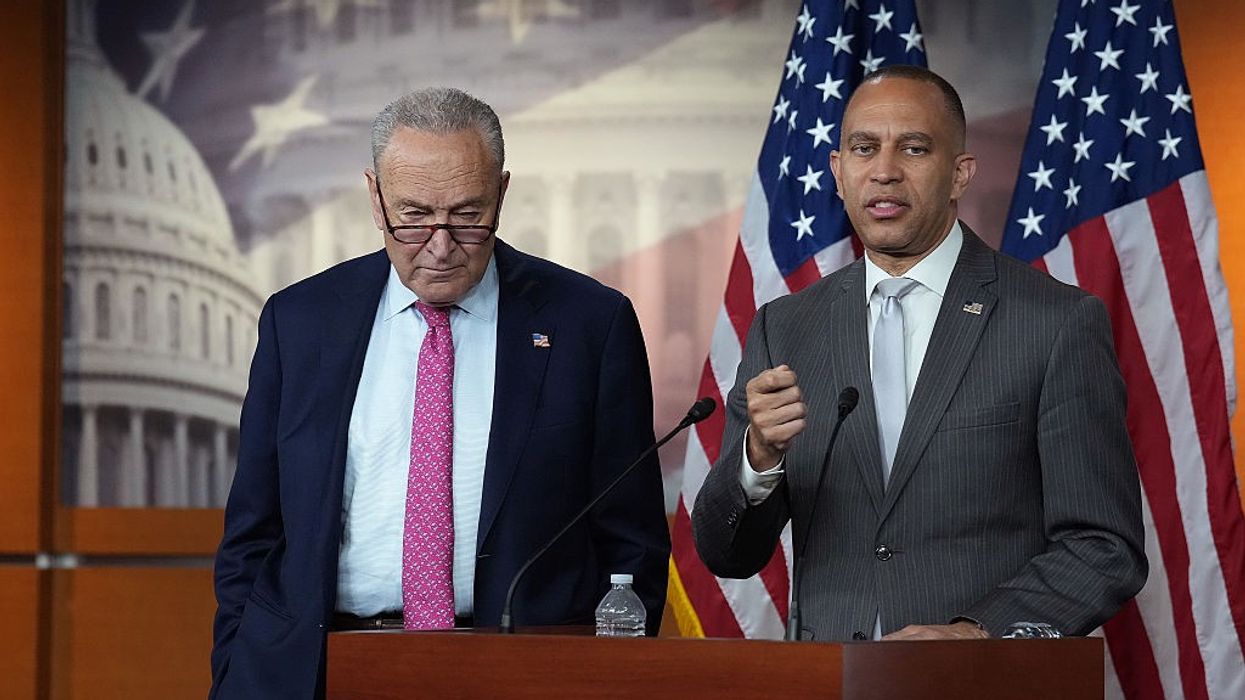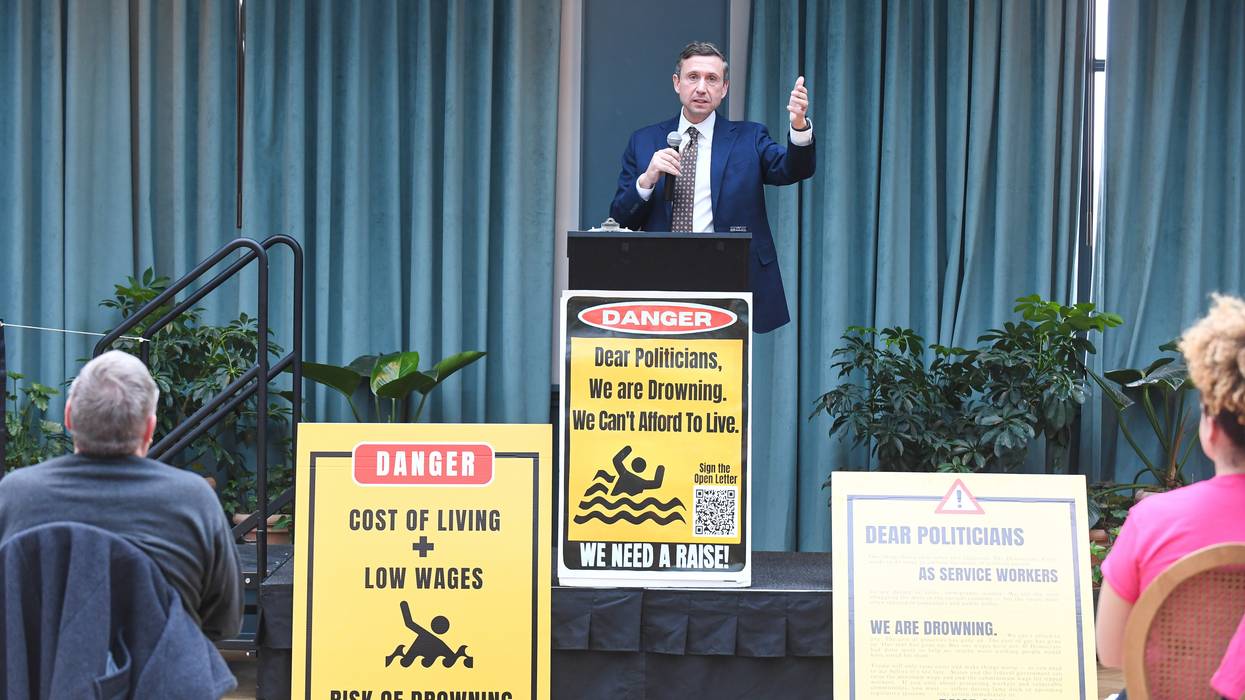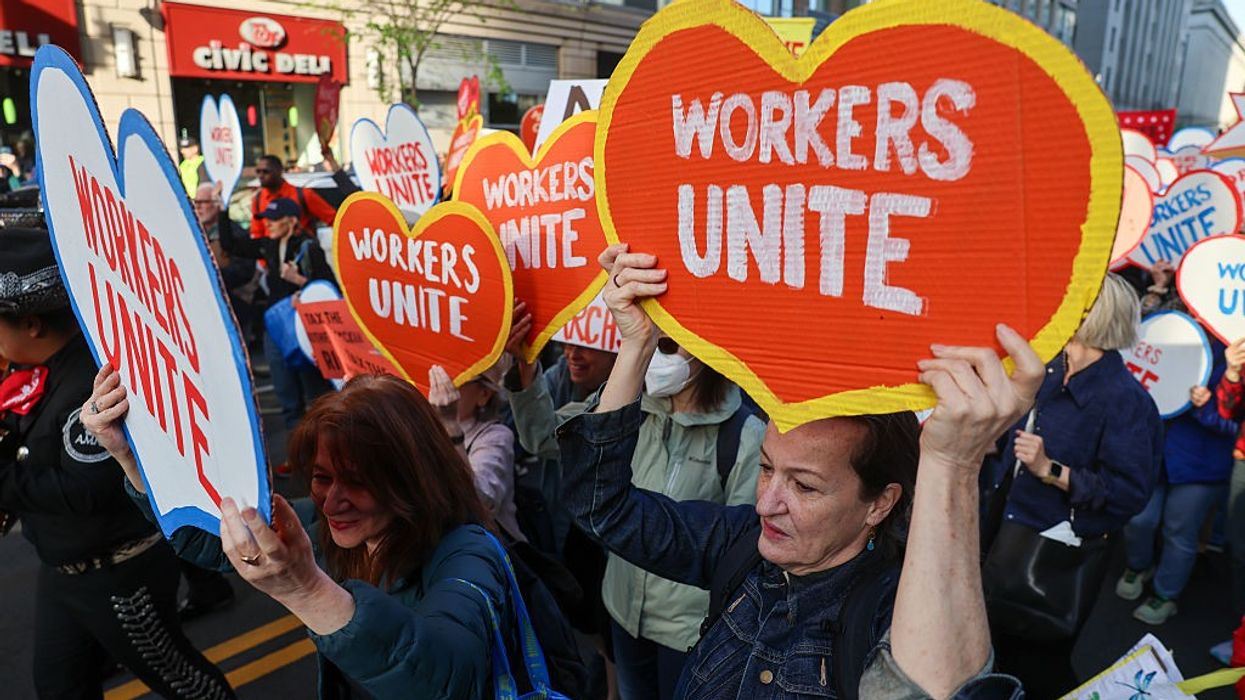To the extent there is any governing body, it's the Democratic National Committee. The DNC should provide leadership at times like these. But there’s still no leadership, several months into a second Trump regime that’s much worse than the first. There's energy to oppose, but it’s uncoordinated.
Rethinking the Left and the Party
ESKOW: Here’s a challenge. For too long, the American left looked to the Democratic Party for leadership and guidance instead of considering it an instrument that’s available to movements. I think a lot of people assume that “a united front” against Trump means making the left fall in line yet again behind the institutional party’s corporate, so-called “centrist” politicians.
SOLOMON: It’s dubious, and not very auspicious, to follow “leadership” that isn’t leading. I think your word “instrument” is an excellent one. The left should consider the Democratic Party a tool that not only can be used but, under this electoral system, must be used to stop the right and advance progressive causes. No other party can win federal elections and stop what has become a neo-fascist Republican Party.
Most of the people who serve as administrative or elected Democrats consider social movements subordinate to their electoral work. They see progressives—the grassroots activists, the ones with deep concerns, who do research, who communicate, who organize in local communities, who provide hope—as fuel for them to win elections.
That's backward. Campaigns and candidates should be subordinated to progressive social movements, not the other way around. That's how we win. Change doesn't come from the top. The great advances—Social Security, Medicare, Medicaid, antiwar, gay rights, civil rights, women's rights, reproductive freedom—came from people who weren’t held into check by the party apparatus. They came from the grassroots, the social movements.
Big Money, Big Problems
ESKOW: Progressives inside the party have told me how complicated it is to work within the party. Each state party has its own rules and its own representatives to the DNC, and there are also other appointed members and other centers of power. They’re up against complex machinery whenever they try to change anything.
Worse, the party allows dark money in its primaries and is heavily reliant on it in general elections. Party operatives—thousands of them, in think tanks and consulting firms and so on—depend on that money for their livelihood.
Kamala Harris raised more money than perhaps any candidate in history. I think that money actually hurt her. It dissuaded her from saying the things she needed to say to win, whether she meant them or not.
How can a popular front incorporate and influence a party that’s dominated by big donors? Isn't that the elephant in the room?
SOLOMON: Well, certainly the money is huge, but we want to be realistic without being defeatists. With the state supreme court election in Wisconsin a few weeks ago, Elon Musk literally tried to buy the election and failed. That was a victory against the tide of big money. But yes, money typically correlates with victory.
I attended the DNC’s so-called Unity Reform Commission meetings in 2017, when the power of the Bernie Sanders forces was at high ebb. The party’s centrists, corporatists, and militarists felt it necessary to give the left some seats on that commission. But they kept a voting majority, which they used to kill some important reforms for transparency and financial accountability.
Jennifer O’Malley Dillon, who was then the Clinton-aligned chair, helped defeat those proposals. And what happened to her? She became deputy chief of staff in the Biden White House, then effectively ran Biden’s reelection campaign. And, after Biden belatedly pulled out and left chaos behind, suddenly Jen O’Malley Dillon was running the Harris campaign.
As you said, a lot of money was sloshing around. It’s hard to spend a billion dollars-plus in a few months and not have a lot of pockets being lined. Lots of it goes to consultants who broker deals, hire other consultants, and arrange TV advertising. They love advertising because it's easy and you don't have to relate to people. (Note: Many consultants are also paid a percentage of each ad buy.)
Meanwhile, we heard afterwards that African-American organizers in places like Philadelphia had been asking Where's our help? Where are our resources?—while TV stations in their states were filled with Harris ads.
That’s not to villainize Jen O’Malley Dillon. She's just an example. Certain people will always win. They’ll always make tons of money, no matter what happens on Election Day.
Would the Party Rather Lose Than Change?
ESKOW: Let me underscore that point about insiders. I think they would all prefer winning to losing. I don't know anyone who’d rather lose. But their incentives are misaligned. There are times when, consciously or not, they feel there are worse things than losing. Take Bernie Sanders, whose policies and fundraising model threatened the Democratic ecosystem that feeds them. In a choice between winning with Bernie or losing—even to Trump—they’d rather lose. Their incentives make losing preferable to turning the party over to unruly Sanders types like—well, like you.
SOLOMON: I think that's a fair point. Remember, when Bernie was at high ebb in primaries, a lot of traditional Democrats on Wall Street and elsewhere were quoted as saying if Sanders is the nominee they might go with Trump.
Imagining a “Popular Front”
ESKOW: Let's try to envision a popular— well, I call it a “popular front.” I don't think others use that term, but I think of the wartime alliance under FDR that included everyone on the left—including Communists, socialists, mainstream labor, radical labor, moderate Democrats—everyone. From the radical left to the center, people made common cause against fascism. I think there is common cause again. You can see it in the threats to the judicial system, to media independence, educational independence, and other pillars of civil democracy. Those pillars were already tattered, and many are already broken, but what remains is endangered.
How can the left build that alliance without either surrendering leadership on its ideas or being subsumed by the “Vote Blue, no matter who” rhetoric that always gives us the same failed party leadership?
SOLOMON: It's a challenge. To use a word that might seem jargony, we should take a dialectical approach. We should look at these contrary, sometimes seemingly contradictory realities and see them all. Fred Hampton was a great young leader of the Black Panther Party, murdered with the collusion of the FBI and Chicago police. There’s video of him saying that nothing is as important as stopping fascism because fascism is gonna stop us all. Malcolm X said that if somebody is holding a gun on you, your first job is to knock the gun out of the hand.
The right is holding a gun on you. There are neoliberals and there are outright fascists. Neoliberalism is a poison. It’s a political economy that makes the rich ever richer and immiserates everybody else, while destroying the environment and creating more and more militarism. But the fascists are holding a gun to our head.
We have an opportunity to creatively acknowledge that two truths exist simultaneously in 2025. We have a responsibility and imperative to join with others to defeat this fascistic group, which means forming a de facto united front with militarists and corporatists. And, at the same time, we need to fight militarists and corporatists.
So, there we are.
A Time for Left-Populism
ESKOW: This may be blue-sky thinking, but it occurs to me that the progressive movement can display leadership and vision in forming that front, at a time when those qualities seem to be lacking elsewhere. It could build a broad alliance while simultaneously attracting people to the left’s ideas and leadership. We wouldn’t try to subordinate people to our will in this alliance, as has been done to us in the past. Instead, in this admittedly optimistic scenario, some people will be attracted by the left’s vision and leadership.
SOLOMON: Absolutely. One of the recent dramatic examples is AOC and Bernie going to state after state, often in deep red districts, and getting huge turnouts. In 2016’s primary, Bernie went to the red state of West Virginia and carried every county against Hillary Clinton.
These examples undermine the mainstream media cliches about left and right because they’re about populism. It's about whether people who are upset and angry—and a lot of people in this country are—are encouraged to kick down or kick up.
The right wing—the fascists, the militarists, the super pseudo masculinists—they love to kick down. That's virtually their whole program: attacking immigrants, people of color, women, people who have been historically shafted. Progressives should kick up against the gazillionaires and the wealthy power brokers who hate democracy.
ESKOW: That kind of populism resonates. Expanding Social Security resonates. Healthcare for everyone resonates. It resonates among self-described conservatives, Republicans, whatever, as well as liberals and progressives. We could be saying to people, “They’re distracting you. It's not trans kids who are ripping you off and making your life so miserable. It's those guys over there.”
It’s been striking to see how passive the party was in the face of this year’s onslaught, and how passive so much of it continues to be. The right got off to a running (or crawling) start on demolishing what remains of democracy. And yet, we were flooded with Democratic operatives like James Carville, who openly use the phrase “playing possum” when describing how the party should respond. Hakeem Jeffries, Minority Leader of the House, said we can't do anything because we don't have the votes. Senate Minority Leader Chuck Schumer helped pass Trump’s budget.
It felt like the party leadership had wiped its hands and walked away from the catastrophe it helped create. People who want to fight Trump will also have to fight this inertia—even though many of the party’s presumptive presidential candidates are distinguishing saying, no, no, I'm going to come out swinging. I'm going to be the candidate who comes out swinging against the right.
I always tell people that if they’re going to work in Democratic Party politics, they should heed the biblical injunction about the world: be in it, but not of it. And I think that activists should go where their inclinations and their talents lead them. They should follow the path that calls out to them.
Working Inside the Party
ESKOW: But if people are called to do Democratic Party activism, what exactly does that look like, given what they’re up against? What’s the mechanism of activist involvement?
SOLOMON: I think the right wing has in the last decades been much more attentive and attuned to the reality that everybody in Congress is elected from somewhere else, not DC. You wouldn't know that when you talk with a lot of the Democrats and Democratic-aligned groups there. Some people in that bubble think that's where the action is, where power is wielded. But, as you say—to the extent we have democracy and there are still some democratic structures as of now—the action is in the grassroots, in communities.
There are well over 1,000 different congressional offices. Members of the House have district offices. They are, in a nonviolent way, sitting ducks to be confronted. Voters are facing questions of life and death, whether it's healthcare or the genocidal war on Gaza that the U.S. continues to arm, or so many other concerns. We could be confronting these people in Congress when they don't do what they should be doing.
Those folks are not gods. They should be confronted. And there's often a dynamic on the left where, if Congressperson X does some things that we appreciate and a couple of things that we think are terrible, there's a tendency to say, “Well, I appreciate the good things. I don't want to be mean just because I differ on one or two things.”
The right wing rarely takes that tack. They go to the mat. They fight for exactly what they believe. That’s been successful for them—very successful.
We have the chance to really make an impact right now. But we’re often told, “Cool your jets. You don't want to be divisive.” Bernie got a lot of that. AOC gets a lot of that. We’re told, “You don't want to be like the Tea Party from the last decade.” And the astute response is, “Oh, yeah, what a disaster. The Tea Party took over the Republican Party. That must have been just a terrible tactical measure.”
It's a way of being told to sit down and do what you're told. The right doesn't do that—maybe because, ironically, they have less respect for authority figures. We don't need deference to leaders who don't provide leadership.
Can We All Just Get Along?
ESKOW: On the right, the nastiness is directed against what was the institutional party establishment. But a lot of centrist Democrats, leaders and supporters alike, seem to get angriest at the left for bringing up certain ideas. It’s like we’re just like spitting in the punch bowl, that it's wrong and rude and who the hell do you think you are? The left has the ideas, but I also think we have to deal with a kind of professional/managerial class culture that can be quite hostile.
It feels like we have to say, “No, we're actually your friends, because a) we can help you and b) in your hearts, you want these things too. Don't be annoyed. We’re not ‘indulging ourselves’ by speaking up. We're helping.”
I struggle with that all the time. And I wonder what your thoughts are.
SOLOMON: That’s the corrosive culture of thinking the people in charge know best. That culture includes a substantial proportion of the Congressional Progressive Caucus. And it also happens because the financial and party pressures on elected officials are intense.
A few minutes ago I mentioned my admiration for Bernie Sanders and Alexandria Ocasio-Cortez and their anti-oligarchy tour. They've been great. But we should not erase the historical memory that, even after Joe Biden’s disastrous debate last summer and up until the day he withdrew from the race, Bernie Sanders was publicly adamant that Biden should stay in the race. AOC was adamant that Joe Biden should stay in the race.
That made no sense whatsoever. And as someone on the RootsAction team, that isn’t just hindsight. RootsAction launched the Don't Run Joe campaign at the end of 2022. You didn't have to be a rocket scientist or a political scientist to know that Joe Biden was incapable of running an effective campaign for reelection.
ESKOW: We also saw the Congressional Progressive Caucus leadership endorse Biden a year before the election, if I recall correctly.
SOLOMON: Oh, absolutely. The chair at the time, Pramila Jayapal, endorsed him two years ahead of the 2024 election day.
ESKOW: It’s also striking what wasn't said during those two years. We heard virtually nothing about Medicare for All, which went off the political radar. We didn't hear much about expanding Social Security. Joe Biden promised to expand it in the campaign and never said another word about it.
“Inside/Outside”
ESKOW: We could go on. But to me, and speaking of embracing contradictions, this speaks to the ongoing need for activists. Because here’s the ultimate irony for me about the phenomenon we've just described. Capitol Hill progressives, many of whom I respect, essentially replicated what party insiders did to them in 2015 and 2016 when they were told not to challenge Hillary Clinton.
SOLOMON: Good point.
ESKOW: It says to me we’ll always need outside activists pounding on the door, however annoying they may find us to be from time to time. It’s an “inside/outside” game.
SOLOMON: Jim Hightower said it's the agitator that gets the dirt out in the washing machine.
ESKOW: He also said there's nothing in the middle of the road except yellow lines and dead armadillos.
Call for an Emergency DNC Meeting
ESKOW: Let’s close with this. RootsAction has been calling for an emergency meeting of the DNC to address the crisis of fascism, or what I would join you in calling neo-fascism. What's the thinking there and what's the status of that?
SOLOMON: I think of a quote from James Baldwin. He said that not everything that is faced can be changed, but nothing can be changed unless it's faced. We're in an emergency, and we're getting very little from what amounts to the party’s governing body, the Democratic National Committee—even acknowledging that it is an emergency. There's pretty much a business-as-usual ambience, although the rhetoric is ramped up.
The DNC, which has 448 members, normally meets twice a year. If, in the midst of emergency year 2025, you remain committed to meeting only twice a year, you're conveying something very profound. You’re communicating that you're not operating in the real world of an emergency.
That's where we are right now. So, in partnership with Progressive Democrats of America, RootsAction has launched a petition (which people can find at RootsAction.org) urging the DNC to hold an emergency meeting. People can still sign it. And we know that the chair of the DNC, who has the power to call such a meeting, knows full well about this petition.
But right now it’s still business as usual. So, I think we need to ramp up these demands.
ESKOW: And meanwhile the party is at historic levels of unpopularity. You'd think that’s one emergency they would recognize.
SOLOMON: One would think so. The latest polling showed only 27 percent of voters had a favorable view of the Democratic Party. You would think that one or two alarm bells would go off. Maybe the “same old, same old” isn't going to do it anymore.
The above dialogue was adapted from a discussion on The Zero Hour podcast.




